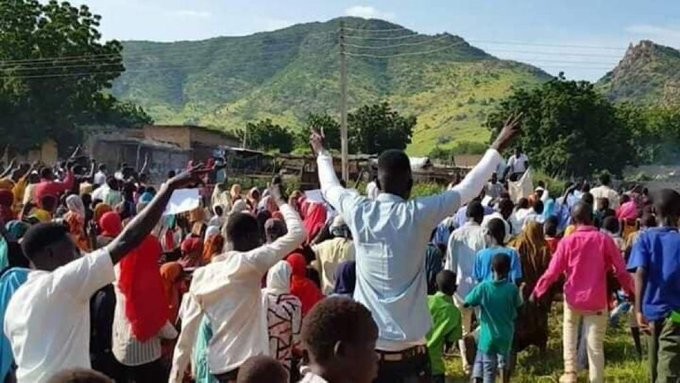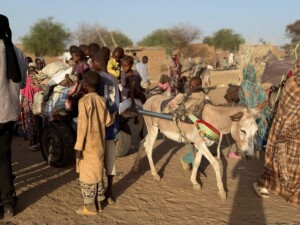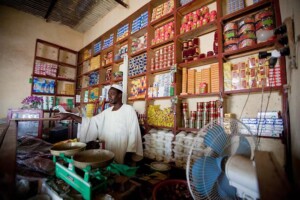Gold mining suspended after environmental protests in South Kordofan

Protests against harmful mining practices in Talodi in 2019 (File Photo: RD correspondent)
The director of Ghadeer locality in South Kordofan suspended the gold mining activities of El Masar Company on Wednesday until further notice after local protests against the company’s continued use of cyanide and mercury. In Talodi locality, a reconciliation document was signed with representatives of the El Junaid Gold Mining Company.
The director of Ghadeer locality in South Kordofan issued a decision to suspend the gold mining activities of El Masar Company until further notice after protests by resistance committees against the company’s continued use of cyanide and mercury.
The South Kordofan Resistance Committees Coordination welcomed the decision in a press statement. “The vigil of the resistance committees in Ghadeer to protest against the company has been successful as it led to the suspension of its mining activities.”
The committees renewed their “categorical rejection of mining activities that use materials harmful to health and the environment”.
They also said that the company “signed unfair agreements affecting the people of the locality”.
Last month, the grassroots activists accused native administration leaders of signing “an illegal agreement with the El Masar Company, failing to consult the local residents”. They argued that, in particular, local residents must be consulted on the toxic mining waste (called karta in Sudan).
The resistance committees warned that the return of gold mining companies will cause societal and environmental instability in the region.
Reconciliation
Community leaders in Talodi, South Kordofan, and representatives of the El Junaid Gold Mining Company signed a reconciliation document, also on Wednesday.
Sources reported that the two sides agreed to put aside differences over development issues in Talodi locality through dialogue and agreed on the provision of services and compensation for those who were affected during violent incidents three years ago.
In early September 2019, the Rashad, Ghadeer, and Talodi localities in South Kordofan witnessed almost daily mass protests and sit-ins against the use of toxic substances in gold mining after environmentalists reported the death of a large number of livestock and birds following the decision of the acting governor to resume mining in the state in July.
On September 11, the governor of South Kordofan ordered the closure of all mining plants in the state in reaction to pressure from environmental health activists and protesting residents who worried about the hazards of the use of the highly toxic mercury and cyanide to extract gold. The mining companies however refused to implement the governor’s order.
Concerned residents of Talodi and Kalogi continued to protest for at least another month.
Al Junaid and the RSF
Lt Gen Mohamed Hamdan ‘Hemeti’, Commander of the infamous paramilitary Rapid Support Forces (RSF) that grew out of the Janjaweed and Deputy Chairman of Sudan’s Sovereignty Council, has family ties that link him to El Junaid Gold Mining Company, which operated the economically important Jebel Amer gold mines in North Darfur until end 2019.
Former Janjaweed leader Musa Hilal seized control of the Jebel Amer gold mining area in July 2015 and, according to a UN Security Council report in April 2016, profited from vast gold sales. Sources claim that Hemeti was behind the detention of Hilal in 2017 before taking over the operation of the mines. According to the NGO Global Witness, Hemeti captured a large part of the gold market in Sudan in previous years, bringing him much wealth and power.
In 2020, the government took over control of the Jebel Amer gold mines. Last year, however, CNN published an investigation disclosing how “Russia is plundering gold in Sudan to boost Putin’s war effort in Ukraine” with the complicity of Sudanese military rulers, especially the RSF.

(File Photo: Leyland Cecco)
Health risks
Environmentalists have been warning of the health and environmental hazards of the use of toxic mercury and cyanide to extract gold from ore for years.
A recent report on mercury poisoning in Sudan points out that “years of indiscriminate use of dangerous chemicals such as mercury, cyanide, and thiourea without protective measures for miners or local populations has exposed millions of citizens across Sudan to lethal risks”.
The Sudan Democracy First Group also highlighted the human and environmental costs of traditional gold mining in the region in a report published in November 2018.
In January 2018, a medical team led by the Health Minister of gold-rich South Kordofan investigated the increase in miscarriages, the birth of deformed children, and cases of kidney failure in El Tadamon.
At the same time, Northern State education authorities decided to close the Sawarda school complex in response to cases of coughing, vomiting, and shortness of breath among students. The situation was attributed to the poor environmental and health conditions due to activities of the International Company for Mining, which spread mining waste and dust in the area.











 and then
and then